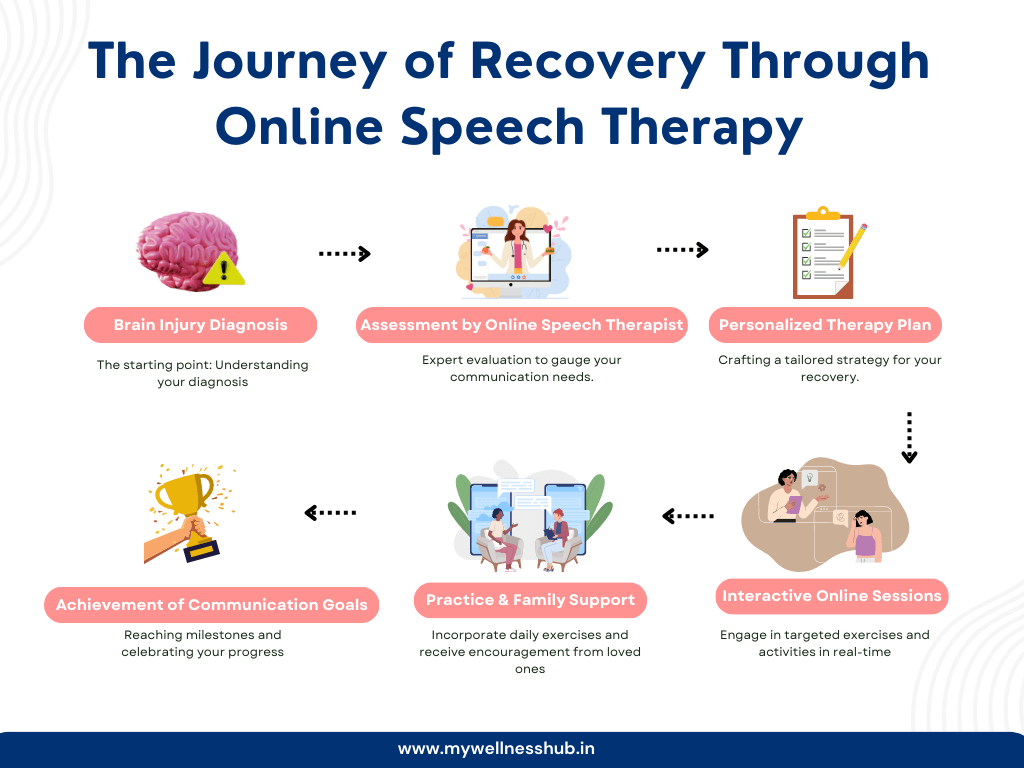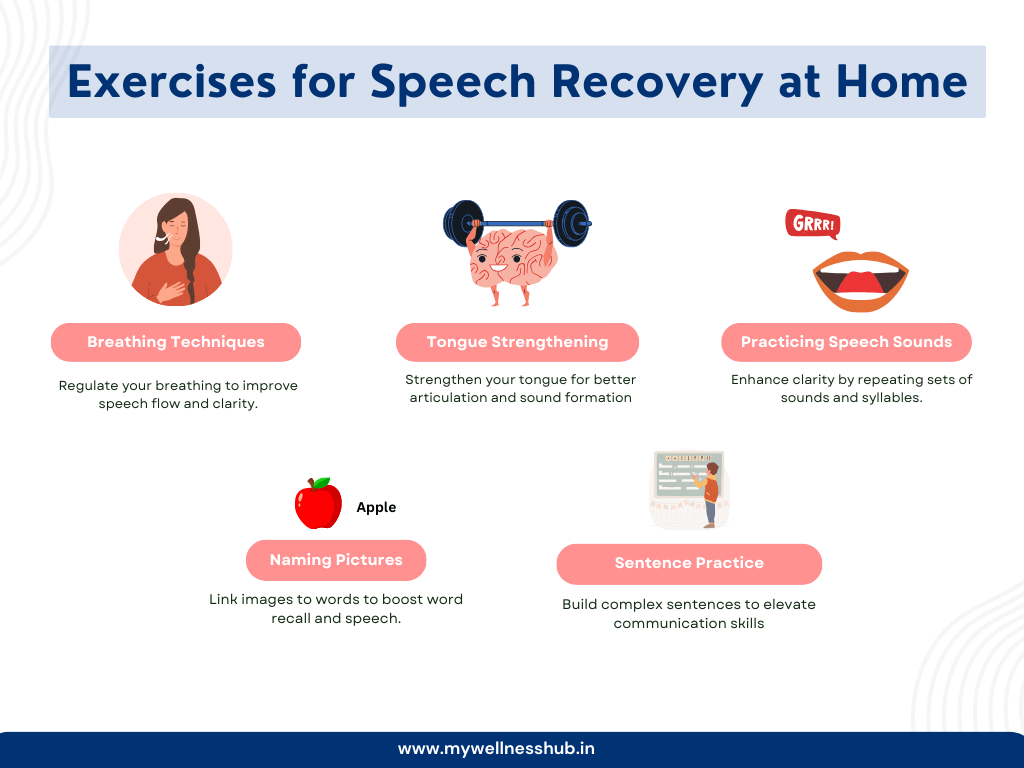Online Speech Therapy for Stroke and Brain Injury Survivors
By Rajini D
Last Updated: April 24, 2024
Imagine waking up one day and finding it hard to say the words that once came so easily. After a stroke or brain injury, this is the reality for many, as speech and communication become challenging hurdles to overcome. But here’s the good news: recovery doesn’t have to be a lonely journey, and regaining your voice is entirely possible.
Online speech therapy offers a lifeline, providing a convenient and effective way to rebuild communication skills from the comfort of home. Whether you’re a survivor or supporting a loved one, this guide will show you how online speech therapy can be a powerful tool in the recovery process. Ready to explore how to reconnect with your world? Let’s dive in!
Understanding Speech Impairments Post-Stroke and Brain Injury
Recovering from a stroke or brain injury often feels like navigating a city where all the familiar signs are suddenly unreadable. One of the biggest challenges for survivors is dealing with speech impairments, which can make everyday communication difficult. Let’s break down two common speech issues that can arise after a stroke or brain injury.
Aphasia: Trouble Connecting Thoughts to Words
Imagine knowing what you want to say but struggling to get the words out, like they keep slipping through your fingers. That’s what living with aphasia is like. It’s not just forgetting words—it’s the struggle to communicate thoughts and ideas.
Aphasia can range from mild to severe. Someone with mild aphasia may pause often, searching for words, like saying, “I need… uh… milk.” In more severe cases, it can be hard to form sentences at all, making communication frustrating and isolating.
Read more: Aphasia: Causes, Symptoms, Types and Treatment
Dysarthria & Apraxia of Speech: Difficulty Speaking Clearly
Dysarthria affects the muscles used for speech, making it sound slurred or hard to understand. For example, a person might know exactly what they want to say but it comes out mumbled, like speaking with a heavy blanket over their mouth.
Apraxia of Speech is about coordination. You know what you want to say and how it should sound, but your muscles just don’t move the right way to say it. Imagine trying to say “apple,” but it comes out as “a… a… apple.” It’s frustrating because you know what you want to say, but it doesn’t come out right.
Read More: Don’t Let Aphasia Silence You: 6 Effective Recovery Strategies
Comparison of Speech Disorders
| Disorder | Symptoms | Impact on Life | Treatment Approach |
|---|---|---|---|
| Aphasia | Difficulty in speaking, understanding, reading, writing | Struggles with communication can lead to social isolation and frustration | Personalized speech therapy focuses on improving language comprehension and expression. Use of alternative communication methods may be introduced. |
| Dysarthria | Slurred, slow, and difficult to understand speech | Difficulty being understood can affect personal and professional relationships. | Exercises to strengthen oral muscles, improve breath control, and speech clarity. Techniques to make speech more understandable. |
| Apraxia of Speech | Difficulty in making accurate movements when speaking | Challenges with verbal expression can impact social interactions and self-esteem | Repetition exercises to improve speech muscle coordination. Use of visual aids and cueing techniques to facilitate correct speech production. |
The Revolution of Online Speech Therapy

In today’s digital world, online speech therapy is changing how people recover their communication skills after a stroke or brain injury. This approach combines ease of access, personalized care, and family involvement to make the recovery journey smoother and more effective.
Convenience and Accessibility: A World Without Walls
With online speech therapy, help is just a click away, whether you live in a bustling city or a quiet town. This convenience is especially valuable if traveling is difficult or if there are limited therapy options nearby. For instance, imagine a stroke survivor living in a rural area who can now receive expert guidance without having to drive hours to a clinic. By logging in from home, they can consistently work on their communication skills, keeping up with their therapy routines every day.
Personalized Care: Making Therapy Just Right for You
No two stroke survivors have the same experience, which means each person’s therapy should be unique. Online speech therapy allows therapists to design sessions that match the survivor’s pace and specific needs. For example, a therapist might notice that a survivor needs extra practice with certain words, adjusting exercises to focus on these areas. This level of personalization makes therapy sessions feel more supportive and effective, helping survivors steadily build confidence in speaking.
Family Involvement: Getting Stronger Together
Family support can make a huge difference in recovery, and online speech therapy offers a way for loved ones to get involved actively. Instead of just observing, family members can join in on sessions, learning about the challenges and ways they can help practice between appointments. For example, a spouse could join a session, learning exercises to support their loved one’s progress at home. This way, therapy doesn’t end when the session is over—it becomes a part of daily life, with family members playing a vital role in building strong communication skills.
Online vs. In-person Speech Therapy
| Feature | Online Therapy | In-Person Therapy |
|---|---|---|
| Accessibility | High accessibility: therapy can be accessed from anywhere with an internet connection. | Limited by location; requires travel to the therapist’s office. |
| Customization | Sessions can be easily tailored to the patient’s needs and schedule. | Customization is possible but may be constrained by the therapist’s availability and office hours. |
| Comfort | It can be conducted in the comfort of the patient’s home. | Takes place in a clinical setting, which may not be as comfortable for some patients. |
| Family Involvement | Easier for family members to participate in therapy sessions. | Family involvement is possible but may require coordination and travel. |
| Technology Use | Requires a basic level of technological literacy and equipment (computer/tablet, internet). | Minimal technology use required from the patient’s side |
How Does Online Speech Therapy Work?
Starting online speech therapy is simple and can be done from the comfort of your own home. Let’s walk through the basics, so you know what to expect and can start your journey with confidence.
Beginning Your Journey: The Initial Steps Towards Healing
Getting started with online speech therapy requires just a few essentials:
- A Reliable Internet Connection: A steady connection ensures you and your therapist can communicate smoothly without interruptions.
- A Computer or Tablet: This will be your virtual link to your therapist. It should have a webcam and microphone to allow you both to see and hear each other clearly.
- A Comfortable Space: Choose a quiet spot where you can focus on your therapy without distractions. For example, a cozy corner at home can be perfect for sessions, creating a comfortable setting to concentrate on your progress.
The Therapy Session Experience: What to Expect
It’s natural to feel a bit anxious before your first session. Here’s a look at what you can expect to make the process feel more familiar:
- Personal Introduction: In the first session, your therapist will spend time getting to know you, discussing your communication goals, and understanding any specific challenges you face. This sets the foundation for a personalized therapy plan.
- Interactive Exercises: Therapy sessions often include engaging exercises, like repeating phrases or naming objects on the screen. These activities are chosen to help with your specific speech needs and may vary from session to session as you progress. For instance, a person with trouble forming certain sounds might practice with tongue-twisters to build strength and clarity.
- Real-Time Feedback: One of the best parts of online speech therapy is the immediate feedback. Your therapist can gently correct you, offer encouragement, and help you adjust your approach in real-time, making each session highly effective.
- Guidance for Practice: After each session, your therapist will recommend exercises you can practice between appointments, like saying certain phrases or reading aloud. This extra practice at home is essential for progress, turning daily life into a part of your therapy journey.
Exercises and Activities to Expect

Online speech therapy offers a variety of activities to make your communication clearer, boost confidence, and even bring some fun to your therapy journey. Here’s a look at some of the exercises you might encounter.
Breathing and Tongue Strengthening Exercises
- Breathing Exercises: Good breathing control is essential for clear speech. Simple breathing exercises, like taking deep, slow breaths, help control your voice and make speech sound smoother. For example, taking a deep breath and then slowly releasing it as you count to five helps build control that can make your speech clearer.
- Tongue Strengthening: The tongue plays a big role in forming sounds, and strengthening it can improve clarity. Exercises like pressing your tongue against a spoon or moving it in circles are designed to boost muscle control. For example, a therapist might ask you to hold your tongue against your upper teeth for a few seconds, helping your muscles get stronger for clearer speech.
Know more about on Advanced Speech Therapy Exercises for Post-Stroke Rehabilitation
Cognitive and Social Skills Improvement
- Memory and Problem-Solving: Speech therapy often includes memory games and problem-solving tasks that help with mental focus and quick thinking. Activities like matching games or simple puzzles challenge your memory and are designed to make conversation smoother and more engaging. For example, a therapist might use picture-matching games to boost recall, which can help you think faster and respond more naturally in real conversations.
- Social Interaction Exercises: Communication is a two-way street, and practice can make social interactions easier. Role-playing exercises mimic everyday conversations, preparing you to chat with friends or family. A common activity might be practicing ordering a meal, which helps you feel ready for real-life social situations with confidence.
Interactive and Fun Activities
- Games and Puzzles: Therapy isn’t just about practice—it can be fun too! Games like word searches, board games, or memory puzzles make therapy enjoyable while boosting brain function. For instance, word searches can introduce new vocabulary, while board games help with turn-taking and patience, both useful in conversations.
- Artistic Expression: When words feel limiting, art can step in. Drawing, painting, or making crafts provides a creative way to express thoughts and emotions, supporting communication in a relaxed, enjoyable way. This boosts creativity and is a comforting break that still helps with speech therapy. For example, a therapist might encourage you to draw a scene from your day, giving you another way to share experiences.
Conclusion
Regaining communication skills after a stroke or brain injury is possible, and Wellness Hub’s online speech therapy makes this journey accessible, comfortable, and effective. With personalized exercises, real-time feedback, and family involvement, our platform supports you in rebuilding your voice from home. WellnessHub offers expert-led guidance and engaging activities to help you steadily gain confidence in speaking. Progress takes patience, but every session brings you closer to clear, expressive communication. Start reconnecting with your world today!
Frequently Asked Questions:
1. What is online speech therapy?
Online speech therapy is when you get help for speech problems over the internet. You can see and talk to a trained therapist through video calls. They help you with exercises and give advice to improve your speech after a stroke or brain injury.
2. How can online speech therapy help after a stroke?
After a stroke, many individuals face challenges with speech and communication. Online speech therapy provides personalized exercises and strategies designed to improve language skills, cognitive communication, and swallowing ability. It’s a flexible, accessible way to support recovery from the comfort of home.
3. Is online speech therapy as effective as in-person therapy?
Yes, numerous studies and patient testimonials suggest that online speech therapy can be just as effective as traditional in-person therapy. The key to success is the quality of the therapist, the engagement of the patient, and the use of interactive, tailored therapy sessions.
4. Who can benefit from online speech therapy?
Online speech therapy is suitable for stroke and brain injury survivors experiencing speech and communication difficulties. This includes individuals with aphasia, dysarthria, apraxia of speech, and other speech impairments. It’s also beneficial for those who have difficulty accessing in-person therapy due to location, mobility, or time constraints.
5. What equipment do I need for online speech therapy?
All you need is a stable internet connection, a computer or tablet with a webcam, and a quiet, comfortable space for your sessions. The platform used for therapy sessions is typically straightforward to set up and use.
6. Can family members be involved in online speech therapy?
Absolutely. Family involvement is encouraged as it can enhance the therapy’s effectiveness. Family members can learn strategies to support the patient’s communication in daily life, making the rehabilitation process more comprehensive and supportive.
7. How do I choose the best online speech therapy service?
Look for services that offer certified and experienced speech-language pathologists, personalized therapy plans, and positive patient reviews. Services like Wellness Hub, which are committed to providing high-quality, tailored care, are excellent choices for anyone seeking professional online speech therapy.
8. How long does it take to see improvements?
Improvement timelines vary based on the individual’s condition, the severity of the impairment, and the frequency of therapy sessions. Consistent practice and engagement with the therapy process are crucial to making progress.
9. What types of speech and language disorders can online therapy address?
Online speech therapy can help with lots of talking and language troubles from strokes or brain injuries. This includes aphasia, which makes talking and understanding hard; dysarthria, which makes your speech slow or not clear because of muscle problems; and apraxia of speech, where it’s hard to move your mouth properly to speak.
10. Are online speech therapy sessions confidential and secure?
Yes, confidentiality and security are paramount in online speech therapy sessions. Reputable services like Wellness Hub utilize secure, HIPAA-compliant platforms to conduct therapy sessions. This ensures that all personal information and communications are protected, providing a safe and private environment for patients to receive therapy.
About the Author:
Rajini Darugupally
M.Sc., Speech-Language Pathologist (9+ years of experience)
Rajini is a passionate and dedicated Speech-Language Pathologist with over 9+ years of experience, specializing in both developmental speech and language disorders in children and rehabilitation in adults. Driven by a desire to empower each individual to find their voice, Rajini brings a wealth of experience and a warm, genuine approach to therapy.
Currently, at Wellness Hub, she thrives in a team environment that values innovation, compassion, and achieving results for their clients.
Connect with Rajini to learn more about how she can help you or your loved one find their voice.
Book your Free Consultation Today
Parent/Caregiver Info:
Client’s Details:
* Error Message








